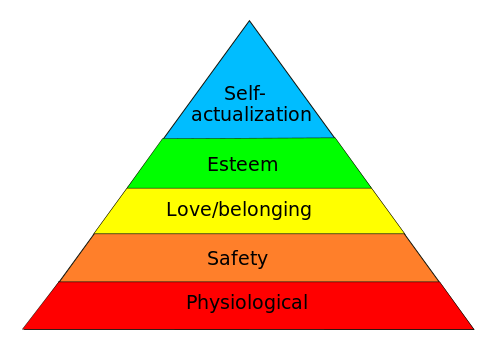
Why you leave one job for another can sometimes be a mystery to your employer. And sometimes, it can be as much of a mystery as to why they aren’t getting the right response to an advert trying to fill your vacancy. But generally, we’ll move positions because we aren’t 100% happy where we are or because we’ll get things we don’t have in our current role. While sometimes it can be hard to pinpoint what that is, there’s a psychological theory that tries to explain things. So why should you leave your job?
Maslow’s Hierarchy of Needs is a psychological theory that puts our needs in order of importance of our happiness. Abraham Maslow put together his hierarchy in 1943, and it still holds water today, with 5 tiers from the most basic needs for survival, up to ensuring high self-esteem and self-improvement. Maslow’s hierarchy is applied to many aspects of business, from motivating staff to recruitment. We have it on our office wall to remind us why someone might be interested in a new position.
At the bottom are the most basic things you need for survival: things like food and shelter, so if this need isn’t being met then you’ll be grateful for any job that puts meals on the table and a roof over your head.
Above that is safety and security. In terms of employment, that means you might be willing to swap a more dangerous job for something a little safer, leave a job due to workplace bullying or look for something when you’re worried that the company you work for will go out of business.
Higher up the triangle comes belonging and love. When this comes into play in looking for a new role, it means perhaps you’ll want to get away from shift work or long travel hours so you can spend more quality time with your family and friends. Failing to get on socially with your co-workers, or even having to work alone for long periods of time, can play a factor here too.
For most people, it’s the top two tiers of the pyramid that are the main factors in considering a change of job. Feeling undervalued or not being recognised for your accomplishments in an organisation can be a big reason people look to change employers, whether that’s financial recognition, or simply being told you’re doing a good job. If companies want to retain their staff, then ensuring employees feel like their contributions matter and are vital parts of the business is crucial. Equally, when you’re taking on new members of staff, then demonstrating that part of your company culture means you’ll come across very well – a bad reputation can cost you dearly when hiring!
Self-actualisation, at the top of the pyramid, is all about self-improvement and becoming a better person – Abraham Maslow used the phrase: “What a man can be, he must be.” Studies have shown that offering opportunities that lead to self-actualisation are the most powerful draws to a new job. In other words, the possibilities for career progression and gaining new skills are the best motivators in the workplace. Not money! We’ve seen that first hand recently, as applicants were willing to take cuts in pay and relocate across the country just to secure a training contract with a local solicitors. Maslow also proposed a sixth level, self-transcendence, that involves committing yourself to a better cause – this can be seen in the appeal of altruistic (but typically unglamorous) professions like healthcare, teaching and charity work.
So if you’re unhappy in the job that you’re in and looking to change position, try and think about what needs your current role is keeping you from – do you want something closer to home, to allow you to spend more time with your family? To work for a company that will acknowledge what you do for it? Or perhaps you want the opportunity to gain new skills and move up the career ladder? And if you’re an employer that’s struggling to hire the right people for the job, perhaps you should consider what you can provide for your staff in terms of flexibility, rewards and progression, as much as you’ll be considering your expectations of them.

